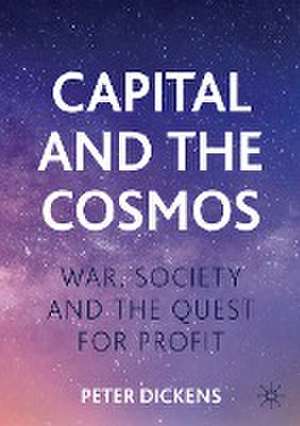Capital and the Cosmos: War, Society and the Quest for Profit
Autor Peter Dickensen Limba Engleză Paperback – 2 ian 2023
The reality is rather different. First, there is no evidence that owners of capital are attempting to extract ‘rare’ materials in the cosmos. The costs would be ‘out of this world’. But capital, not governments, is determining how outer space should be used. Capital’s investments in aerospace companies are actively determining forms of military interventions and the equipment used. And satellite television pumps out forms of culture aimed at a global audience. But these are being ignored and subverted by, for example, indigenous peoples.
In short, this book setsout a new understanding of our relations with the cosmos. The forces of capital are certainly powerful but at the same time they are being challenged, subverted and even overturned.
Preț: 177.26 lei
Nou
Puncte Express: 266
Preț estimativ în valută:
33.92€ • 35.42$ • 28.01£
33.92€ • 35.42$ • 28.01£
Carte disponibilă
Livrare economică 25 martie-08 aprilie
Preluare comenzi: 021 569.72.76
Specificații
ISBN-13: 9783031185007
ISBN-10: 3031185005
Pagini: 158
Ilustrații: XI, 158 p. 8 illus.
Dimensiuni: 148 x 210 mm
Greutate: 0.21 kg
Ediția:1st ed. 2022
Editura: Springer International Publishing
Colecția Palgrave Macmillan
Locul publicării:Cham, Switzerland
ISBN-10: 3031185005
Pagini: 158
Ilustrații: XI, 158 p. 8 illus.
Dimensiuni: 148 x 210 mm
Greutate: 0.21 kg
Ediția:1st ed. 2022
Editura: Springer International Publishing
Colecția Palgrave Macmillan
Locul publicării:Cham, Switzerland
Cuprins
1. The Cosmos: Capitalism’s Outside?- 2. Libertarianism, Fantasy and Cosmic Capitalism.- 3. Individualism, Narcissism and the Cosmos.- 4. Circuits of Capital, Circuits of Earth.- 5. Producing Spacecraft.- 6. The Body and the Cosmos.- 7. A Cosmic Risk Society?- 8. Satellites, War and Capital Accumulation.- 9. Cosmic Capitalism and Space Law.- 10. Future Work.- 11. Prefigurative Politics: Towards a Cosmic Socialism?
Notă biografică
Peter Dickens teaches at the Departments of Sociology at Brighton, Cambridge and Lancaster Universities, UK. He is the co-author of Cosmic Society (2007) and co-editor of The Palgrave Handbook of Society, Culture and Outer Space (Palgrave Macmillan, 2016). His book Society and Nature: Changing Our Environment, Changing Ourselves (2006) was given an Outstanding Publication Award by the American Sociological Association.
Textul de pe ultima copertă
This book offers a new understanding of society’s relations with the cosmos. Entrepreneurs such as Jeff Bezos and Elon Musk receive a great deal of publicity, but offer unlikely and implausible visions of space tourism for the general public. Meanwhile, asteroids are seen as ‘rare materials’ which will be extracted and used to produce untold riches for earthbound citizens.
The reality is rather different. First, there is no evidence that owners of capital are attempting to extract ‘rare’ materials in the cosmos. The costs would be ‘out of this world’. But capital, not governments, is determining how outer space should be used. Capital’s investments in aerospace companies are actively determining forms of military interventions and the equipment used. And satellite television pumps out forms of culture aimed at a global audience. But these are being ignored and subverted by, for example, indigenous peoples.
In short, this book sets outa new understanding of our relations with the cosmos. The forces of capital are certainly powerful but at the same time they are being challenged, subverted and even overturned.
Peter Dickens teaches at the Departments of Sociology at Brighton, Cambridge and Lancaster Universities, UK. He is the co-author of Cosmic Society (2007) and co-editor of The Palgrave Handbook of Society, Culture and Outer Space (Palgrave Macmillan, 2016). His book Society and Nature: Changing Our Environment, Changing Ourselves (2006) was given an Outstanding Publication Award by the American Sociological Association.
The reality is rather different. First, there is no evidence that owners of capital are attempting to extract ‘rare’ materials in the cosmos. The costs would be ‘out of this world’. But capital, not governments, is determining how outer space should be used. Capital’s investments in aerospace companies are actively determining forms of military interventions and the equipment used. And satellite television pumps out forms of culture aimed at a global audience. But these are being ignored and subverted by, for example, indigenous peoples.
In short, this book sets outa new understanding of our relations with the cosmos. The forces of capital are certainly powerful but at the same time they are being challenged, subverted and even overturned.
Peter Dickens teaches at the Departments of Sociology at Brighton, Cambridge and Lancaster Universities, UK. He is the co-author of Cosmic Society (2007) and co-editor of The Palgrave Handbook of Society, Culture and Outer Space (Palgrave Macmillan, 2016). His book Society and Nature: Changing Our Environment, Changing Ourselves (2006) was given an Outstanding Publication Award by the American Sociological Association.
Caracteristici
Written by the leading voice in the burgeoning field of sociology of space Provides a critical, social-science approach to the colonisation of the cosmos Written in a clear and accessible manner, which will appeal to undergraduate and postgraduate students alike
